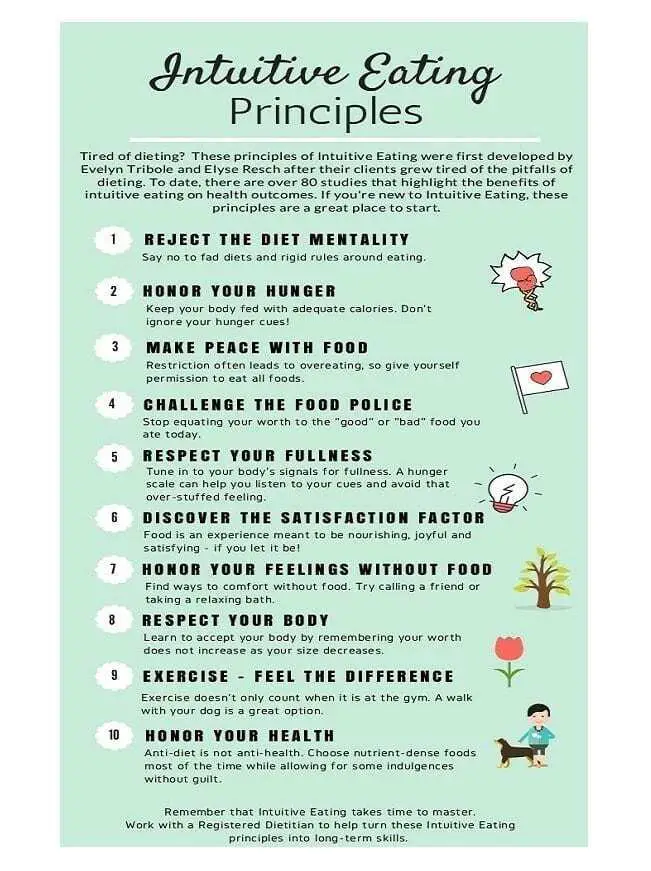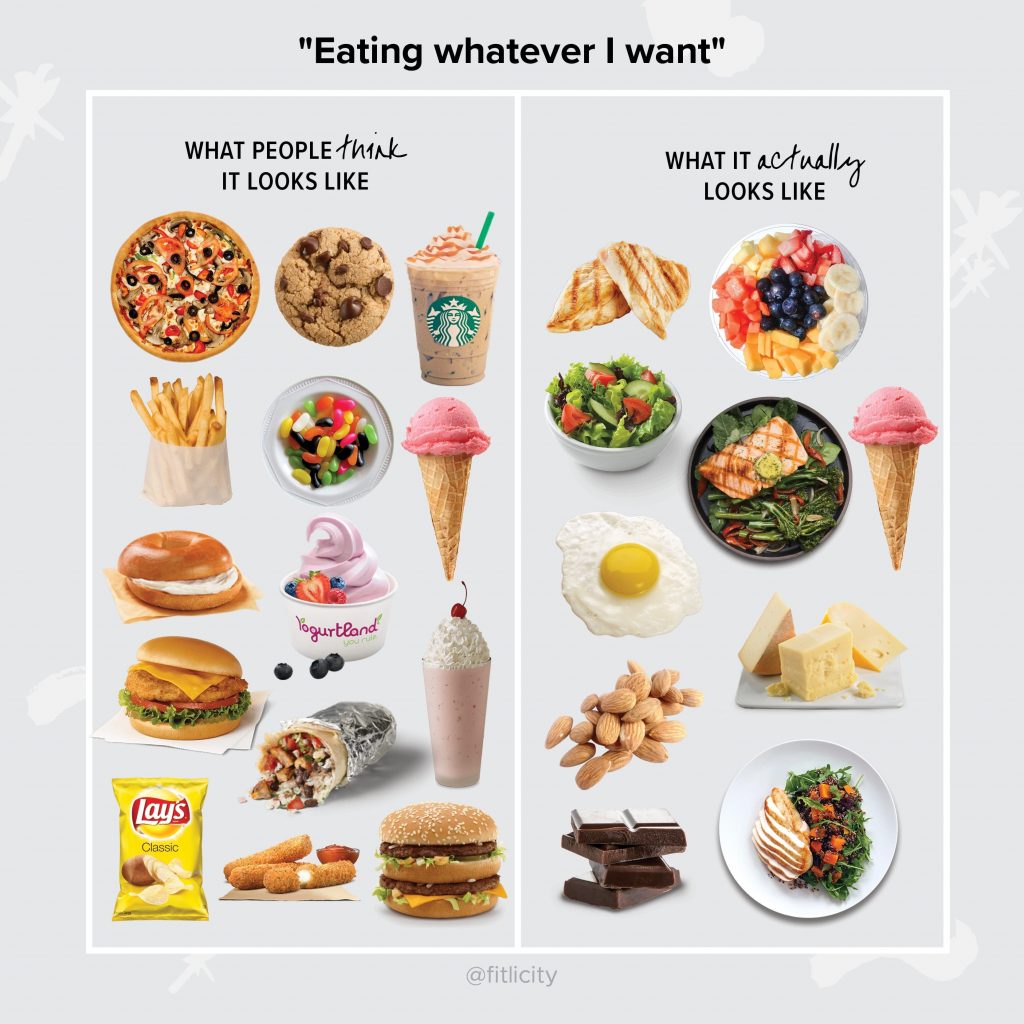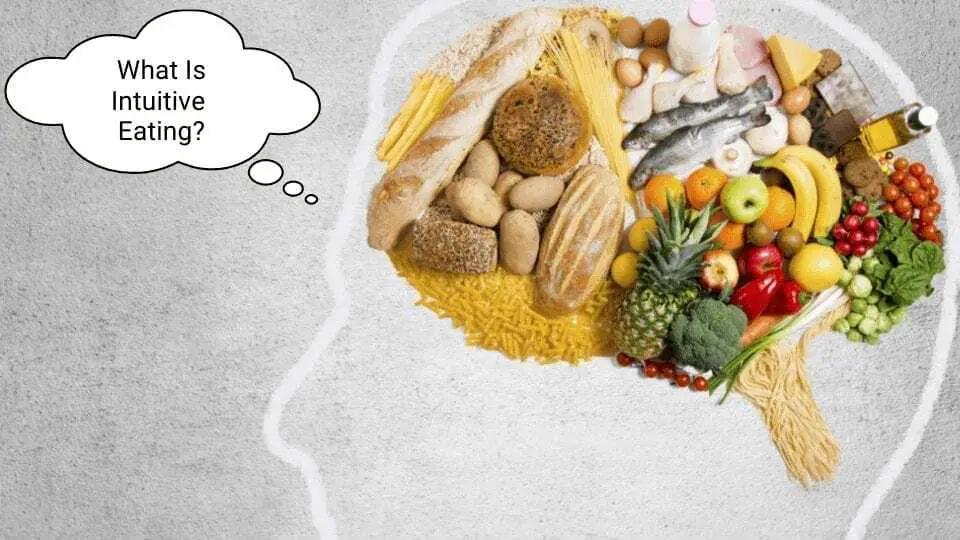Intuitive Eating has no rules, only principles.
Don’t get me wrong – Intuitive Eating principles are backed by science, see this list of over 120 published research studies on Intuitive Eating.
But how do you interpret science? And food science in particular?
Food is a human thing. There’s no black and white answers. No objectively right way to eat.
This is why intuition around food is so important! And yes, I’m talking about your intuition!
Throughout the past years I’ve interviewed dozens of Intuitive Eating experts, coaches, therapists, doctors on my Eating Enlightenment podcast.
In this this post I will briefly analyze each of the Intuitive Eating principles, and write about what first comes to mind.
With full humility, here’s my analysis of these beautiful intuitive eating principles down below.
What is Intuitive Eating? Looking at the 10 Principles

Principle 1 – Reject The Diet Mentality
Millions of Americans continue to diet each year because of the structure that diets provide.
We humans love rules. Rules make things clear. They give us structure.
In the short term, repeat, in the short term, the other reason why diets are so alluring, like fish going after bait because…
However, dieting rules pave the way for a rigid lifestyle of restriction and deprivation.
I can’t tell you how many people I have spoken to who feel totally confused and helpless because of the preposterous amount of food rules that these types of diets impose.
I remember one person told me they spent 30 minutes comparing two cans of beans in the supermarket!
Principle 2 – Honor Your Hunger
Honoring your hunger means training yourself to pay attention to both the emotional and physical aspects of hunger.
I figure you know what the physical feels like, but the emotional side of hunger is even more important. When I say “emotional hunger,” I mean “feeling” things more subtly than just a hunger pang – that is, the ‘quiet voice’ of your belly. This quiet voice may speak to you in:
- gurgles
- rumbling
- emptiness
- other sensations
And training yourself to become sensitive to your stomach in this way leads to enhanced hunger strengths and abilities, which means – ultimately – you’ll be able to prevent yourself from entering ‘survival’ mode (a concept I cover more in this article here about starting intuitive eating)
To start explaining this principle, let’s first compare hunger to weight lifting.
Your hunger is like a muscle that can be trained. With practice, over time you can enhance your hunger strength and abilities:
- Notice when you are hungry
- Distinguish between ravenous hunger and moderate hunger
- Distinguish between emotional hunger versus physical hunger
And just like muscles, if you stop working out and being active, you lose your muscles. Hunger is the same way. If you don’t connect with your hunger and distinguish the differences in the above list, then you stop being able to feel your hunger.
How do you stop feeling your hunger more subtly? Oftentimes people spend all of their attention concentrating on following their diet rules rather then listening to their stomach. Over time, you might lose the ability to feel your hunger.
What happens when you stop feeling your hunger? You spiral out of control. You eat haphazardly and then binge. Worst of all, you feel the desire for more structure and control, so you start to diet again and the cycle restarts.
In contrast, if you DO connect with your hunger, then you can avoid binging, emotional eating, etc.
Unfortunately, most people who I work with began to ignore their hunger in innocence.
Just the other day a woman told me how she and her mom together went to the dietitian’s office the first day of highschool. Together they started a diet the first day of high school. It was a family affair. Her mom was proud of the young lady her daughter had become.
And at first they bonded because they lost weight together (I’m unsure if mom was on diet too but definitely was invested in her daughter losing weight).
So later on when this young girl regained the weight from dieting (because that’s what you do – regain the weight and more when you diet) her relationship with her mother became strained and never recovered.
Can you see the innocence? People start dieting innocently, but then quickly pay the price.
There’s good news, though. While over time you may have lost connection to your own body, with Intuitive Eating now you just have to practice.
First you have to honor your hunger by realizing diets will never work!
Second, by making a commitment to practicing your hunger skills, instead of dieting, you can relearn how to hear feel your hunger.
(And as you learn and practice more, you’ll also find that understanding food preferences is key to intuitive eating – I’ll talk much more about food preferences and “intuition” in Principle 6 below, but let’s take it step by step).
Principle 3 – Make Peace With Food
Is a donut good or bad?
Sure, a donut has more calories than a piece of carrot. Are you a better person for having a carrot? Or are you a worse person for having a donut? No. Of course not.
At first glance this principle might appear to be unhealthy. You might think that if all foods are equal, why not eat donuts 24/7?

The truth is different.
If you make all foods morally equal then you end up eating a variety of all foods.
“”Morally equal” means that you give yourself permission to eat all foods, if you genuinely want to, without judgment. This principle will dramatically change your relationship with food …
Normally people guilt trip themselves when they eat unhealthy foods. They start off by making certain foods good and other foods bad.
But humans are wired to automatically crave foods that are bad. We love being bad and dirty!
So people are ‘good’ for awhile and then something happens. Their willpower and motivation dries up. When a person’s willpower and energy levels are low … then that’s when their secret desires spring forward. The bad foods are binged on!
All these problems stem from judging foods as being good or bad. Drop the judgment towards food. Make peace with food.
Allow your body to eat what it wants.
Stop basing your self worth and judging yourself based on what foods you eat!
Instead of all this guilt, redirect this energy into noticing how the foods make you feel. Give up the idea of morally right or wrong foods!
Principle 4 – Challenge The Food Police
The Food Police symbolize our internal and cultural standards towards food. Oftentimes our inner voice demands perfection!
If we have even one cookie then we think we are a failure. Have you ever felt this way? Where you make have one mistake when eating and then you say to yourself “f**k it!” and then go proceed to binge like crazy?
In this principle you learn to identify and hear the different voices in your head, which are collectively called the Food Police. The Food Police are your inner judge and jury. They condemn you and are the voices responsible for making you feel ashamed about your eating habits.
It takes courage and effort to stand up to the Food Police voices.
I remember that back when I lived as a monk and started exploring mindfulness and mindful eating, I started getting first hand exposure to these voices that were ruining my life without my knowledge!
And over the years, I’ve found that some degree of sincere, effort, contemplation and reflection is necessary to identify these voices. This really is part of the commitment and daily practice we talked about above, of learning how to tune in to your feelings about hunger.
There are additional tools from Cognitive Behavioral Therapy which can be incredibly helpful in helping you realize these voices are false, not true, and extremely biased.
As you learn to stand up to your inner Food Police, you also start to learn how to access your Inner Nurturing voice.
THIS voice empowers you to calm down and meet your emotional needs.
Principle 5 – Respect Your Fullness
This principle is related to hunger but in the opposite sense – fullness.
Getting too full is like the picture above which shows a bunch of water spilled on the ground. The lesson is when you pour too much water in a glass you get messy.
The same thing is true of eating, but it doesn’t need to be this way. You can be “full” without going over the top!
To feel your fullness I have one key training principle for you that’s pretty straightforward and that I teach each of my clients. Are you ready?
Just notice when the food starts tasting not as a good.
The first bite is amazing. The second bite is great. The third bite is good. The fourth bite is ok. The fifth bite you don’t really want.
To respect your fullness, you will need to listen to your body and taste sensations – that is, you’ll need to learn how to identify when you about ready to over the top. But if you can simply slow down and , mindfully eat intuitively, then you will be able to respect your fullness levels.
One last thing about fullness – people say letting go of food judgment is the scariest part of Intuitive Eating.
Yet people say the most difficult part of intuitive eating is learning when you are full.
And please understand that this is a process, a journey, which is why you need to make that commitment to daily practice.
You’ll be eating food and suddenly realize you ate too much! What happened? Nothing happened. It’s called learning. It’s like you fell over on the bike. Does that mean you rode the bike wrong? No. You just pick yourself up and make a mental note. No guilt. Just see what you can learn and move on.
The next time you are approaching your fullness, you’ll be better prepared to stop eating.
Principle 6 – Discover The Satisfaction Factor
You have two choices when you eat food, and you alone are the only person who can decide.
What are you deciding between? The choice is simple – do you like this food or not?
Do you like how it makes you feel physically? Are you satisfied while eating the food? Basically, does the food satisfy you?
To make this decision you’ll have to be “present and in-the-moment” (that is, you’ll have to be paying attention) and slow down. You’ll have to taste the food.
And remember, most foods are always available. You no longer have to scarf down the brownies at the social event after work because you never have brownies and this is your one and only chance.
Now you finally have a chance to make a decision about brownies based upon how brownies make you feel. Instead of being driven by scarcity and dieting rules, you stand at a fork in the path.
You can like brownies. Seriously, you can.
You can also not like brownies if they don’t make you feel good.
The freedom can be terrifying.
But at the end of the day, if you’ve been following the other principles and are not guilt tripping yourself, then you’ll start to able to reclaim the joy of eating for you personally.
The word ‘discover’ is very apt here. You have to go on a food journey of discovery.
Principle 7 – Honor Your Feelings Without Using Food
In the picture above there is the vast universe.
Your feelings can be scary like the universe. They can seem overwhelming like the number of stars. They can seem confusing like the dark matter mysteries in the universe. You may feel uncertain about your place in the universe.
You may hate the universe or you may hate the cold black space or the laws of gravity. Maybe you can hate your emotions and that you lose control. Or you can despise the fact that you have trauma. Perhaps you avoid your emotions in all sorts of ways these days with Netflix and computers and distractions.
The alternative is you can face the truth. Your emotions can beautiful – just like the universe. The universe can also be a place of wonder, of awe at God’s creation perhaps, of connectedness. Likewise, your emotions are your soul talking to you.
As messy and as chaotic as they may seem, you can learn to soothe your emotions and to make peace with your emotions and your place in the universe. There are stress relief tactics out there!
To start being able to handle emotions without turning to food, you’ll first need to be on a flexible meal schedule and eating regularly, as I discussed in this two step plan to start intuitive eating.
And as I suggested, you’ll most likely need some therapy or coaching for advice and a shoulder to lean on. In fact, that’s what I consider to be my primary job as a coach. To be able to absorb your negative feelings so that you have someone to take the burden, and then my secondary job is when you have released some pent up energy, to ask about your experiences and help you proceed further in this journey. .
Getting you to calm down and relive your experiences, and to relive your experiences with you. Helping you do things differently next time. The key is develop tools to honor your feelings so you don’t totally rely on food.
For me, I needed years of meditation, coaching, therapy, and self-develop to really get more in touch with emotions. I can safely say that this process is worth it.
This principle is all about being willing. Willing to feel, willing to learn skills to manage emotions and being willing to take care of yourself. The scariest is willing to embrace the mess. The hardest is the willingness to journal to sort through the mess. Being willing.
Principle 8 – Respect Your Body
Here’s an interview that says it best: Give up the pursuit of weight loss
Instead focus on sleeping more, doing self-care, living in accordance with your values, sitting with difficult emotions, learning from difficult emotions, and exploring foods to see what feels good to you.
You must realize that you are more than your body. Your life is more than your body. There are many, many aspects to life. If you wait until you are skinny to live your life then you might be waiting forever.
Principle 9 – Exercise And Feel The Difference
Stop taking exercise so seriously! What if laughter counted as exercise just like running on the cardio machines?
There’s more to health and fitness than working out crazy hard and hating yourself because your not strong yet, or you get out of breath.
Remember when you were a kid and could play outdoors for hours because you simply liked it?
What types of movement do you actually like doing? Not for calorie burning. Like hiking – do you go hiking to burn calories or for fun? Of course you go hiking for fun or socializing with your friends. Find more activities like this which you do for fun.
Hiking? Walking? Maybe just an hour of yoga? What do you like to do for fun?
Stop thinking about ‘earning’ food by exercising hard (that is, “oh I’ll do a bunch of exercise and then I can justify eating that donut) . That mentality is going to kill your motivation. What types of exercise do you actually like?
Again, you will be at a crossroads here, just like with food. But stop taking yourself so seriously!
Just laugh and try to have fun. Experiment with different forms of movement.
We’re almost done … the last of the 10 principles of Intuitive Eating is coming up!
Principle 10 – Honor Your Health
It’s not that you can’t have the sugary stuff. No.
In my interpretation, this last principle simply acknowledges the importance of nutrition.
Sometimes people think Intuitive Eating disregards nutrition, but that’s not the case. We simply don’t want to be perfectionistic around nutrition.
We want you to actually be able to have some unless you have an underlying condition like diabetes! But no matter what, we want you to eat the nutritious stuff first you could say!
Finally, in this post I’ve talked a LOT about the 10 principles of Intuitive Eating. If you have any questions or comments please leave down below!




